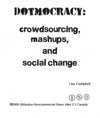Dotmocracy: crowdsourcing, mashups, and social change [eBook]
by Lisa Campbell
Free download
As San Francisco braces itself to be the first major American city to not have a daily newspaper, the canary has sung as the death of print looks eminent. But what new frontiers do new media really offer? Can media democracy be maintained through new forms of citizen media that are more interactive featuring user-generated content?
Now almost anyone can be a media maker, and the whole world is literally watching, recording and listening. The divide between the producer and consumer has begun to dissolve. Crowdsourcing means that news can be created from the people experiencing the situations directly. Instead of producing content in house, aggregated content is the new king, with a whole flood of users openly sharing their photography, writing, and art.
Due to this influx of citizen media content, consumers are increasingly reluctant to pay for corporate media content, including the news. Citizens are turning towards each other for their news, as they send everything from reports on violence in Gaza, to updates on local public transit through text messaging (sms), and blog about both local and global events. This eBook will explore everything from the commonalities between popular theatre in the slums of Rio and Open Source software; how raves and hip hop effect how we collect and visualize data; and how the participatory, open nature of new media technology have infected our world’s politics.
With citizens picking up cameras and mobile phones, and the old media slowly going bankrupt, there will be a critical disruption in our traditional media landscape. By capturing the essence of a new generation of new media technology, this eBook aims to sketch out these new technologies, and how they are transforming the media landscape as we know it.
Lisa Campbell serves as the Director of Communications for Youth Action Network and is finishing her Master of Environmental Studies at York University with a special focus on Youth, New Media and Social Change.





[…] See the rest here: Putting people first » Dotmocracy: cro&… […]
[…] create something really serious,†said Greye, who is 8 years old and lives in Mays Landing, N.J Dotmocracy: crowdsourcing, mashups, and social change [eBook] – experientia.com 03/22/2009 Dotmocracy: Crowdsourcing, Mashups, and Social Change by Lisa Campbell […]
“Dotmocracy” is a timely exploration of our radically changing media landscape. However, I would question what Lisa Campbell means when she asks if we can “maintain media democracy”. Newspapers, for example, have traditionally had an elite readership because of their analytical capacities–not necessarily their ability to “break news”, which was superceded by 24-hour cable in the 90s.
It is perhaps more important to look at how the networking and connectivity allowed by the Internet is improving popular access to newspapers and an increasingly wide spectrum of information. The consequences of this nearly universal access will determine the impacts of the peer production Campbell is referring to. It is also already driving how Generation Y, currently entering the workforce, thinks about world events, designs their own work, and identifies with society.